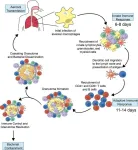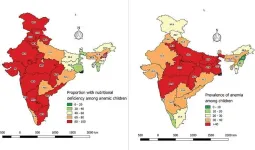(Press-News.org) The cost of climate change may be six months off the average human lifespan, according to a study published January 18, 2024, in the open-access journal PLOS Climate by Amit Roy from Shahjalal University of Science and Technology and The New School for Social Research, U.S.
Temperature and rainfall — two telltale signals of climate change — cause myriad public health concerns, from the acute and direct (e.g., natural disasters like flooding and heat waves) to the indirect yet equally devastating (e.g., respiratory and mental illnesses). While impacts like these are observable and well documented, existing research has not established a direct link between climate change and life expectancy.
To clarify this relationship, the author evaluated average temperature, rainfall, and life expectancy data from 191 countries from 1940-2020, using GDP per capita to control for drastic differences between countries.
In addition to measuring the isolated impacts of temperature and rainfall, the author designed a first-of-its-kind composite climate change index, which combines the two variables to gauge the overarching severity of climate change.
Results indicate that in isolation, a global temperature increase of 1°C is associated with an average human life expectancy decrease of approximately 0.44 years, or about 5 months and 1 week. A 10-point increase in the composite climate change index — which accounts for both temperature and rainfall — is expected to decrease the average life expectancy by 6 months. Women and individuals in developing nations are disproportionately affected.
Beyond the results of this study, Dr Roy is hopeful that the composite climate change index will standardize the global conversation about climate change; become a usable metric for the nonscientific public; and encourage collaboration and even friendly competition among countries to combat the impacts of climate change.
Mitigating greenhouse gas emissions and adapting to a changing environment are of particular importance, the author says.
To complement this large-scale approach, the author suggests localized future studies that consider specific severe weather events (e.g., wildfires, tsunamis, and floods), the impacts of which cannot be fully captured through analyzing temperature and rainfall alone.
Dr. Roy adds: "The global threat posed by climate change to the well-being of billions underscores the urgent need to address it as a public health crisis, as revealed by this study, emphasizing that mitigation efforts to reduce greenhouse gas emissions and proactive initiatives are essential to safeguard life expectancy and protect the health of populations worldwide."
#####
In your coverage please use this URL to provide access to the freely available article in PLOS Climate: https://journals.plos.org/climate/article?id=10.1371/journal.pclm.0000339
Citation: Roy A (2024) A panel data study on the effect of climate change on life expectancy. PLOS Clim 3(1): e0000339. https://doi.org/10.1371/journal.pclm.0000339
Author Countries: Bangladesh, US
Funding: The author received no specific funding for this work.
END
Climate change may reduce life expectancy by half a year, study suggests
On its own, a 1°C temperature rise might shave off about 5 months, with women and people in developing nations disproportionately affected
2024-01-18
ELSE PRESS RELEASES FROM THIS DATE:
Remodeling the immune system to fight tuberculosis
2024-01-18
AMHERST, Mass. – Tuberculosis, caused by the bacterium Mycobacterium tuberculosis (Mtb) kills upwards of 1.6 million people a year, making it one of the leading causes of death by an infectious agent worldwide—and that number is only growing larger. How, exactly, Mtb evades the immune system isn’t yet known, but a collaborative team of researchers from the University of Massachusetts Amherst and Seattle Children’s Research Institute recently discovered something surprising: prior exposure to a genus of bacteria called Mycobacterium seems to remodel the first-line defenders in the body’s immune system. Furthermore, how ...
6 in 10 sampled under-5s in India have micronutrient deficiencies, and 4 in 10 have anaemia, per survey of 17,230 children
2024-01-18
6 in 10 sampled under-5s in India have micronutrient deficiencies, and 4 in 10 have anaemia, per survey of 17,230 children.
####
Article URL: https://journals.plos.org/globalpublichealth/article?id=10.1371/journal.pgph.0002095
Article Title: Prevalence and determinants of anemia due to micronutrient deficiencies among children aged 12–59 months in India–Evidence from Comprehensive National Nutrition Survey, 2016–18
Author Countries: India
Funding: The authors received no specific funding for this work. END ...
DNA becomes our ‘hands’ to construct advanced nanoparticle materials
2024-01-18
Evanston, IL In a paper to be published in Science Jan. 18, scientists Chad Mirkin and Sharon Glotzer and their teams at Northwestern University and University of Michigan, respectively, present findings in nanotechnology that could impact the way advanced materials are made.
The paper describes a significant leap forward in assembling polyhedral nanoparticles. The researchers introduce and demonstrate the power of a novel synthetic strategy that expands possibilities in metamaterial design. These are the unusual materials that underpin “invisibility cloaks” and ultrahigh-speed optical computing systems.
"We manipulate ...
Repeated sexual failures cause social stress in fruit flies
2024-01-18
Repeated failures to reproduce make fruit flies stressed and frustrated, which in turn makes them less resilient to other types of stress, Julia Ryvkin at Bar-Ilan University and colleagues report in the open-access journal PLOS Genetics, publishing January 18.
Animals are motivated to take actions that improve their survival and reproduction through reward systems in the brain, but failure causes stress. The reward systems have been extensively studied, but less attention has been paid to how animals respond to failure. To investigate, researchers compared ...
Complement system causes cell damage in Long Covid
2024-01-18
Most people infected with the SARS-CoV-2 virus recover after the acute illness. However, a significant proportion of infected individuals develop long-lasting symptoms with a wide range of manifestations. The causes and disease mechanisms of Long Covid are still unknown, and there are no diagnostic tests or targeted treatments.
Part of the immune system active for too long
A team of researchers led by Onur Boyman, professor of immunology at the University of Zurich (UZH) and Director of the Department of Immunology at the University Hospital Zurich (USZ), has shown in a study that the complement system plays an important role in Long Covid. It is part of the innate immune system ...
Analysis of brain tumor blood vessels yields a candidate therapy—and a platform to find more
2024-01-18
JANUARY 18, 2024, NEW YORK – A Ludwig Cancer Research study has generated a granular portrait of how the cellular and molecular components of the blood vessels that feed brain metastases of melanoma and lung and breast cancers differ from those of healthy brain tissue, illuminating how they help shape the internal environment of tumors to support cancer growth and immune evasion.
Led by Ludwig Lausanne’s Leire Bejarano and Johanna Joyce, researchers also developed a platform to identify potentially targetable vulnerabilities in the vasculature of brain metastases. They report in the current issue of Cancer ...
UChicago, Caltech study suggests that physical processes can have hidden neural network-like abilities
2024-01-18
We tend to separate the brain and the muscle—the brain does the thinking; the muscle does the doing. The brain takes in complex information about the world and makes decisions, and the muscle merely executes. This has also shaped how we think about a single cell; some molecules within cells are seen as ‘thinkers’ that take in information about the chemical environment and decide what the cell needs to do for survival; separately, other molecules are seen as the ‘muscle,’ building structures needed for survival.
But a new study shows how the molecules that build structures, i.e, the muscle, can themselves do both the thinking and the doing. The ...
Wireless drug patch shows promise as chronic disease treatment delivery system
2024-01-18
CHAPEL HILL, NC – University of North Carolina at Chapel Hill scientists created a new drug delivery system, called the Spatiotemporal On-Demand Patch (SOP), which can receive commands wirelessly from a smartphone or computer to schedule and trigger the release of drugs from individual microneedles. The patch’s thin, soft platform resembles a Band-Aid and was designed to enhance user comfort and convenience, since wearability is a crucial factor for chronically ill patients.
The research team, led by Juan Song, PhD, professor of pharmacology ...
AI can boost service for vulnerable customers
2024-01-18
AUSTIN, Texas –– Artificial intelligence has become the Swiss Army knife of the business world, a universal tool for increasing sales, optimizing efficiency, and interacting with customers. But new research from Texas McCombs explores another purpose for AI in business: to contribute to the social good.
It can do so by helping businesses better serve vulnerable consumers: anyone in the marketplace who experiences limited access to and control of resources.
“AI is widely recognized for its operational and ...
Structural study points the way to better malaria drugs
2024-01-18
Structural insights into a potent antimalarial drug candidate’s interaction with the malaria parasite Plasmodium falciparum have paved the way for drug-resistant malaria therapies, according to a new study by researchers at Weill Cornell Medicine and Van Andel Institute.
The antimalarial molecule, TDI-8304, is one of a new class of experimental therapeutics that targets the proteasome, an essential, multiprotein complex in P. falciparum cells. Two years ago, the researchers showed in a preclinical study that TDI-8304 potently kills malaria parasites at multiple stages of their life cycle and ...
LAST 30 PRESS RELEASES:
Cal Poly’s fifth Climate Solutions Now conference to take place Feb. 23-27
Mask-wearing during COVID-19 linked to reduced air pollution–triggered heart attack risk in Japan
Achieving cross-coupling reactions of fatty amide reduction radicals via iridium-photorelay catalysis and other strategies
Shorter may be sweeter: Study finds 15-second health ads can curb junk food cravings
Family relationships identified in Stone Age graves on Gotland
Effectiveness of exercise to ease osteoarthritis symptoms likely minimal and transient
Cost of copper must rise double to meet basic copper needs
A gel for wounds that won’t heal
Iron, carbon, and the art of toxic cleanup
Organic soil amendments work together to help sandy soils hold water longer, study finds
Hidden carbon in mangrove soils may play a larger role in climate regulation than previously thought
Weight-loss wonder pills prompt scrutiny of key ingredient
Nonprofit leader Diane Dodge to receive 2026 Penn Nursing Renfield Foundation Award for Global Women’s Health
Maternal smoking during pregnancy may be linked to higher blood pressure in children, NIH study finds
New Lund model aims to shorten the path to life-saving cell and gene therapies
Researchers create ultra-stretchable, liquid-repellent materials via laser ablation
Combining AI with OCT shows potential for detecting lipid-rich plaques in coronary arteries
SeaCast revolutionizes Mediterranean Sea forecasting with AI-powered speed and accuracy
JMIR Publications’ JMIR Bioinformatics and Biotechnology invites submissions on Bridging Data, AI, and Innovation to Transform Health
Honey bees navigate more precisely than previously thought
Air pollution may directly contribute to Alzheimer’s disease
Study finds early imaging after pediatric UTIs may do more harm than good
UC San Diego Health joins national research for maternal-fetal care
New biomarker predicts chemotherapy response in triple-negative breast cancer
Treatment algorithms featured in Brain Trauma Foundation’s update of guidelines for care of patients with penetrating traumatic brain injury
Over 40% of musicians experience tinnitus; hearing loss and hyperacusis also significantly elevated
Artificial intelligence predicts colorectal cancer risk in ulcerative colitis patients
Mayo Clinic installs first magnetic nanoparticle hyperthermia system for cancer research in the US
Calibr-Skaggs and Kainomyx launch collaboration to pioneer novel malaria treatments
JAX-NYSCF Collaborative and GSK announce collaboration to advance translational models for neurodegenerative disease research
[Press-News.org] Climate change may reduce life expectancy by half a year, study suggestsOn its own, a 1°C temperature rise might shave off about 5 months, with women and people in developing nations disproportionately affected




